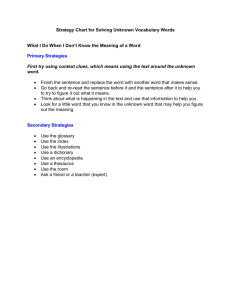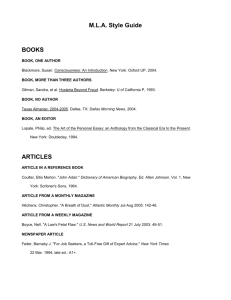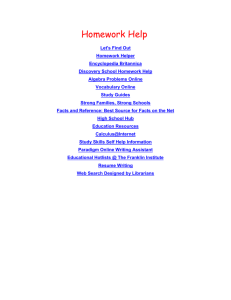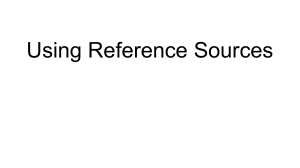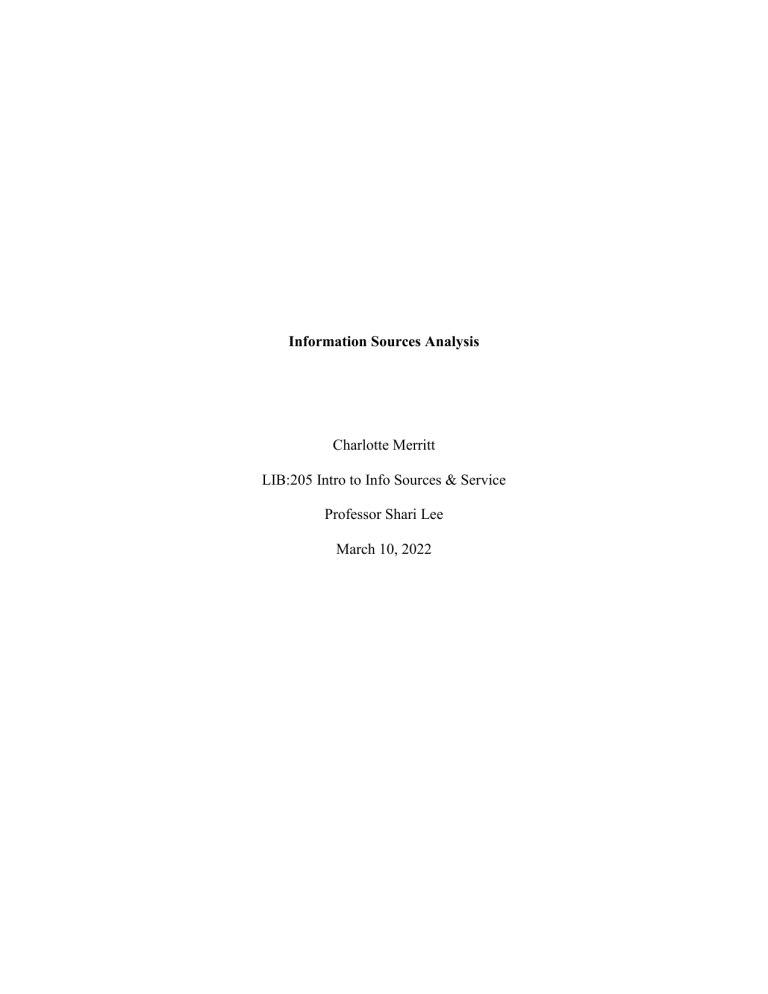
Information Sources Analysis Charlotte Merritt LIB:205 Intro to Info Sources & Service Professor Shari Lee March 10, 2022 Regarding the texts to be studied, despite my best attempt to locate a physical copy of a 2020 dictionary, which didn’t seem difficult at first glance, I was unable to do so after visiting two libraries and four bookstores, then ordering one online only to have the funds returned because they were out of stock. Instead, I will be comparing the COVID definitions of MerriamWebster online and Encyclopedia Britannica online. FORMAT: Without context, one would assume the definition of the virus found in the dictionary would suffice, and while the pronunciation, origin, and symptoms are very important information and key to defining it in lay terms, it lacks substance and contains some strange notes that muddy the entry with unnecessary information. The advantage a print edition would have over digital is that space is limited due to printing costs, and it would be more concise than the digital version. The obvious disadvantage to an American library is that they would have to purchase multiple copies to assist multiple users. Whereas in less developed countries a print edition may be the only available format. Digital wins over print because it is accessible, low or no cost, and updated for free. Print editions take up space, cost money to acquire and update, and are only available locally to as many users as the library possesses copies. The difference between the dictionary and the encyclopedia reference however is more technical. While both entries cover the definition and origin, the Britannica version contains information concerning the composition of the virus and its relation to the SARS virus family. It speaks of its transmission and the fact it is a zoonotic disease, both important pieces of information regarding a pandemic disease. Again, the notes in the middle muddy the entry. But I am uncertain if this is because the research is related, or the editor didn’t suffer from the constraints of print editions. Both entries were also about two pages long, but the encyclopedia entry was significantly broader and much more in-depth information. With all the advantages of digital over print listed above, the only argument for print lies in the incidental exposure to information in the pursuit of facts. Like the card catalog, the random absorption of data in the process of locating specific information has yet to be replicated digitally. It is unlikely that the human mind can create a computer capable of such random albeit useful intent. SCOPE: In the area of chronology, both entries are identical. Since the majority of the information was not available until the end of 2019, the 2020 edition is the most recent definition of COVID-19. Both texts are from long-held reliable sources of information, but Encyclopedia Britannica contains more useful information than the Merriam-Webster entry. This is inherent in the difference between a dictionary and an encyclopedia which is something to consider when recommending a source of information for defining a subject. I personally lean towards the encyclopedia for two reasons, it contains a larger breadth of information while still containing a definition, and they are often illustrated to provide additional context to the subject. AUTHORITY: While both companies maintain separate headquarters, Merriam-Webster was acquired by Encyclopedia Britannica in 1964. Encyclopedia Britannica started in Edinburgh, Scotland in 1768, ending their print edition in 2012 and maintaining a standard of excellence for over 250 years. While Merriam-Webster started in Springfield, Massachusetts in 1831. Both operate online sites which are regularly updated and sources of information are thoroughly vetted. Merriam-Webster maintains a limited print series mostly aimed at students and medical professionals which is considered the gold standard in dictionaries across the planet, exceeded only by the Oxford dictionary which contains more slang definitions than Merriam-Webster. UPDATING: The Encyclopedia Britannica is only available online since 2012. Print editions are available from Merriam-Webster (if you can find them) on a limited basis. Both sites update their internet data at least annually, more if major historical events occur. MerriamWebster prints their dictionaries annually and revises and edits them about every ten years. Before the encyclopedia went out of print, I would have advised the dictionary as a source of more recent information considering most libraries do not have the budget to acquire a new set annually. But since the digitization of both sources, my preference has shifted to the encyclopedia. In terms of useful information, a dictionary cannot compete with an encyclopedia. ACCESS: As discussed above, the problem with print is that it is limited to only a single user at a time and is less cost effective than digital sources. This is why both Merriam-Webster and Encyclopedia Britannica have digitized their volumes. The ease of use, multiple points of access, and low cost have made print editions nearly obsolete. In the case of World Book, the existence of a print encyclopedia has become a niche market which they exploit for a profit. With very few exceptions, there are no libraries in the United States that do not have internet access. This keeps cost low and allows multiple users to access the information simultaneously. In the past, CD-ROMs were sent via mail to places where internet was not available. But this too is nearly obsolete in the internet saturated United States of America. The advantage print would have over both items is that print would be available if there were a power outage and you wouldn’t need a computer with internet to access it while travelling. RETREVIAL: The ease of use inherent in digital reference makes it a strong favorite among users. However, the curiosity of the growing mind is limited by indexes and searchable databases. Most of the information I absorbed in school was a deviation for the assigned task that occurred while thumbing through a card catalog or flipping through an encyclopedia. I am biased in this regard, as most modern learners only use dictionaries and encyclopedias to find a single subject. Much in the way civil discourse has been replaced by internet searches, the method of learning has limited its scope to only the subject concerned. There is nothing wrong with the easy and useful design of digital reference. Both Merriam-Webster and Encyclopedia Britannica feature the standard author, title, subject search capability. The medical dictionary even contains a Boolean search, (if memory serves) and DOI searches. Again, print would be at a disadvantage here due to library hours, the prominence of the reference section at the library, and the number of books available to users. ORGANIZATION: The dictionary is always arranged alphabetically, as is the encyclopedia. But the encyclopedia refers to other subjects related to the entry while the dictionary only refers to definitions of the same word. Even a thesaurus will only refer to words with similar meanings. The encyclopedia contains more real-world information. Instead of just defining the word, it defines the subject as completely as possible. The Encyclopedia also uses graphics and photos to add context to the entry. The subject is first defined, then expanded upon with historical data, and related subject following the subject-specific information. TREATMENT: AUDIENCE: Encyclopedias are inherently designed for students. They contain verified sources of information for the growing mind to absorb. While dictionaries exist simply to show the common usage of a word at the time of printing. This makes them useful not only for students, but for anyone looking to a quick easy method of increasing their understanding on a specific subject. That being said, encyclopedias may offer users information they were not aware was related to the subject. Spontaneous learning is difficult to come by in the one-click world of education modern learners know making it superior to the dictionary. CONTENT RELATIVE TO OTHERS: Much in the way languages have changed over the years, the dictionary has changed as well. Instead of broadly defining the words contained within, they offer a relative definition based on the location they are printed in. Merriam-Webster is largely an American product, hence its differences from the Oxford dictionary, which is largely circulated in European countries. Therefore, its definitions and spellings are aligned with the ones inherent in Europe. The encyclopedia differs in this sense as the entry is defined by the subject and not its usage. CONCLUSION: While the dictionary is a quick and easy source of information it lacks depth and, in some cases, context pertaining to the subject. The encyclopedia contains more information making it a superior resource to the dictionary. The advantages of digitizing both encyclopedias and print include low cost, ease of use, along with simultaneous use for multiple patrons. With regard to its use in the library, the print edition is inferior due to the expense to obtain and update, that multiple copies would have to be purchased for multiple users to access, and that it would use a large amount of shelf space that could be put to better use for other items. I would conclude that the digital Encyclopedia Britannica is superior to Merriam-Webster based on its scope of information, relative content, and format. Like the dictionary, it is easily accessed and updated without the limitations of print editions. But the information s organized in a way that is more readily absorbed by a greater number of users. REFERNCES: Cassell, K. A., & Hiremath, U. (2018). Selecting and Evaluating Reference Materials. In Reference and information services: An introduction (pp. 347–360). essay, ALA NealSchuman Association. Encyclopedia Britannica (2020). coronavirus. Encyclopedia Britannica. https://www.britannica.com/science/coronavirus-virus-group Merriam-Webster (2020). COVID-19. Merriam-Webster. https://www.merriamwebster.com/dictionary/COVID-19
